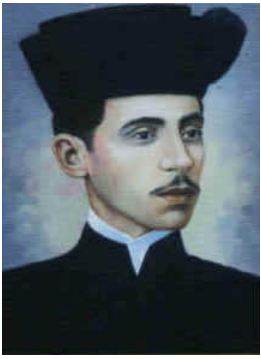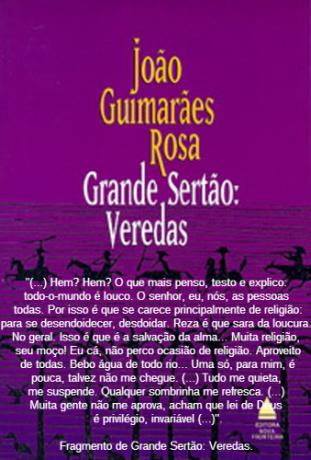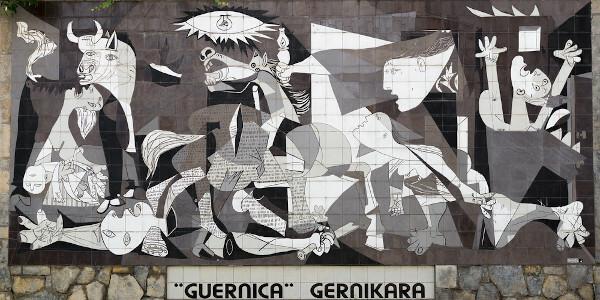Augusto dos Anjos, the darkest of Brazilian poets, was also the most original. His poetic work, composed of just a book of poems, doesn't fit in any literary school, although it was influenced by characteristics of the Naturalism and Symbolism, the unique production of Augusto dos Anjos cannot be framed in any of these movements. É that's why we classify the poet together with the his contemporaries of pre-modernism.
Blending philosophical terms steeped in pure pessimism and scientific vocabulary that would rarely be found in texts poetic, Augusto dos Anjos wrote a violent, visceral poetry, crossed by a cosmic anguish, by an eternal memory sepulchral.
Read too: Lima Barreto – great name in Brazilian pre-modernist prose
Augusto dos Anjos Biography
Augusto de Carvalho Rodrigues dos Anjos was born on April 20, 1884, at Engenho Pau D’Arco, Vila do Espírito Santo, current municipality of Sapé, in Paraíba. Son of former planters, the poet experienced, from childhood, the slow decay of his family. His father, who had a degree in Law, taught him his first letters until he entered the Liceu Paraibano to attend secondary school.
In 1903, enrolled at the Recife Faculty of Law. During this period, he began to publish some poems in the Paraiba newspaper The trade. The verses caught the attention of readers, especially in a negative way: the poet was seen as hysterical, unbalanced, neurasthenic, qualities that would be attributed to him throughout his life. In Paraíba, he was nicknamed “Doctor Sadness”.
Graduated in 1907, Augusto dos Anjos never practiced the profession of lawyer or magistrate. He moved from Recife to the capital of Paraíba, where he started teaching Portuguese Language and Brazilian Literature. In 1910, he married Ester Fialho, with whom he had three children – the first of them died still newborn.

Disagreements with the governor of Paraíba led the poet to transfer to Rio de Janeiro, where he began teaching Geography after being unemployed for about a year. In 1912,publishes his only book, Me, with the financial help of the brother. But he didn't get any recognition from the reading public – except for the repudiation of the critics of his time, attached to measured and Parnassian lyricism.
In June 1914, he moved to Leopoldina (MG), assuming the position of director of a school group in the city, but a double pneumonia interrupted the poet's trajectory. died at just 30 years old, on November 12, 1914.
Do not stop now... There's more after the advertising ;)
Augusto dos Anjos style
Augusto dos Anjos is probably the most original of Brazilian poets. Although it has received some influences from the Symbolism and Naturalism, poetic movements in vogue at the time, his literary style did not fit either school.
Pessimistic, cosmic, paradoxical, morbid and distressing, the poetry of Augusto dos Anjos is made of a scientific vocabulary mixed with a deep sadness. Existential questioning meets science and Darwin's Theory of Evolution in an unusual combination, never seen before, that constantly reminds us of the fatal human finitude in the terms ofmatter decomposition, gives rotten meat that closes the time of the living.
Love, pleasure, lust are nothing but an organic struggle of the cells, as is all human existence, destined to become a corpse and feed the decomposing worms. And the verse construction Augusto dos Anjos expresses this struggle: everything is said in a way hard, full of excess and hyperbole, in rigid metric.
It is a aesthetics of rot, agony, deformation, mixing philosophical and biological terms that erupt in a violent cry in search of the reasons for human existence. influenced by Arthur Schopenhauer, whose philosophical theory perceived a perennial impossibility of happiness, since human life is summed up to a pendulum between suffering and boredom, the poetry of Augusto dos Anjos reverberates an “eternal sorrow”, a perennial existential pain to which all beings are relentlessly subjected.
See too: Expressionism – European vanguard that also addressed existential anguish
Works by Augusto dos Anjos
Augusto dos Anjos was poet of one book, entitled Me. This was partly because of his untimely death, partly because of the literary taste of the time, which deliberately ignored his volume of poems, or vehemently rejected it. olavo bilac, quite famous in his time, became aware of the poet's existence only after his death and the hearing one of Augusto dos Anjos' poems declaimed, he said: “You did well in dying, not much is lost”.
The arrogance, petulance and insensitivity of the Parnassian “prince of poets” could not prove more wrong: Augusto dos Anjos got posthumous fame. The third edition of his book of poems, published in 1928, added some more writings to the collection, renamed me and other poetry and sold 3,000 copies in 15 days and 5,500 copies in two months. The book now exceeds 40 editions and Augusto dos Anjos continues to be one of the most read poets in Brazil.
Poems by Augusto dos Anjos
intimate verses
See! Nobody watched the formidable
Burial of your last chimera.
Only Ungrateful - this panther -
She was your inseparable companion!
Get used to the mud that awaits you!
Man, who, in this miserable land,
Lives among beasts, feels inevitable
Need to be a beast too.
Take a match. Light your cigarette!
The kiss, friend, is the eve of the sputum,
The hand that caresses is the same hand that stones.
If someone is even sorry for your wound,
Stone that vile hand that caresses you,
Dust into that mouth that kisses you!
Vocabulary
Formidable: extraordinary, great
Chimera: fantasy, imagination, delirium
“Intimate Verses” is perhaps the best known of Augusto dos Anjos' poems. Decasyllable sonnet, with ABBA-BAAB-CCD-EED rhyming scheme, expresses the revolt at the atrocious experience of the maxim Hobbesian "man is man's wolf". In this “miserable land”, “among wild beasts”, affections do not flourish – it is a world of ingratitude, where the kiss precedes the sputum, where the one who caressed yesterday is now stoning.
Psychology of a loser
Me, son of carbon and ammonia,
Monster of darkness and brilliance,
I suffer, since the epigenesis of childhood,
The evil influence of the zodiac signs.
Deeply hypochondriac,
This environment disgusts me...
A yearning analogous to yearning rises to my mouth
That escapes from the mouth of a heartbeat.
Already the worm - this worker from the ruins -
May the rotten blood of carnage
It eats, and to life in general declares war,
Come peeking into my eyes to gnaw them,
And you'll just leave my hair,
In the inorganic coldness of the earth!
Vocabulary
Rutance: shine, splendor
Epigenesis: process of developing an embryo from a shapeless zygote
Coldness: coldness, indifference
In “Psychology of a Loser”, also a decasyllable sonnet with an ABBA-BAAB-CCD-EED rhyming scheme, we notice the poignant presence of scientific vocabulary parallel to a picture of perennial suffering, which accompanies it since childhood. Miserly (and with a taste for superlatives), feel disgust for the world, as if struck by an illness, with physical symptoms. And he notices attentively the worm, in analogy to death, at the end of existence and matter, that stalks him: it is the rot aesthetics.
modern Buddhism
Take, Dr., these scissors, and... cut
My most unique person.
What does it matter to me that the faggot
All my heart after death?!
Ah! A vulture landed on my luck!
Also, from the diatoms of the lagoon
The cryptogamic capsule breaks down
At right-handed scolding contact strong!
So dissolve my life
Just like a dropped cell
In the aberration of an infertile egg
But the abstract aggregate of homesickness
Keep hitting the perpetual bars
From the last verse I make in the world!
Vocabulary
Diatoms: single-celled algae that carry out photosynthesis and are found in fresh or salt water
Cryptogama: plants that reproduce through spores
Shatter: reduces to dust, crumbles
“Modern Buddhism” is also a sonnet decasyllable, but this time with ABBA-ABBA-CCD-EED rhyming scheme. In this poem, the biological and often strange vocabulary, very unconventional in poetic compositions ("diatoms", "cryptogam", "cell", "egg"), is used to emphasize the organic composition, material of life human. The suggestion for the doctor to cut it is already a first memory of this carnal existence: the heart, sentimental metaphor par excellence, will end up only as food for the decomposing worms.
A curiosity about this particular sonnet is that it was set to music by Arnaldo Antunes.
night complaints
Who was it that saw my Pain crying?!
I go out. My soul leaves in agony.
Dark monsters walk down the road
And along the road, among these monsters, I walk!
[...]
The picture of afflictions that consume me
Pedro Américo himself does not paint...
To paint it, you needed the paint
Made of all man's torments!
[...]
I hit the stones of rough torment
And my hurt today is so intense
That I think Joy is a disease
And Sadness is my only health.
[...]
About love stories or questioning me
It is vain, it is useless, it is useless, in short;
I can't love any woman
Nor is there a woman perhaps capable of loving me.
Love has combs and hot broths,
And while it's good, it's bad;
The poet's heart is a hospital
Where all the sick died.
Today everything I like is bitter;
The morning blessing I receive...
And that's all: the bread I eat, the water I drink,
The old tamarind I lean on!
[...]
Melancholy! Extend your tu’asa to me!
You are the tree on which I must recline...
If someday Pleasure comes looking for me
Tell this monster I ran away from home!
Vocabulary
Unhelpful: unproductive, ineffective, useless
“Nocturnal complaints” is a long poem, composed of 19 decasyllable blocks (rhymes between verses 1 and 4; 2 and 3 of each stanza), from which we highlight some excerpts. We already know from the title that it is a lamentation. Pain, agony, monsters, afflictions, torments, illness: all this affects the poet, whose sadness is so intense that Pedro Américo (1843-1905), the great academic painter responsible for famous paintings such as Independence or death! (1888), would not be able to represent in a work.
The poet himself struggles to express such affliction facing a life in which love, pleasure, sunlight, everything lost its meaning. It is important to mention the tamarind, a tree that has been with him since childhood and that appears in several other poems. This is a biographical fact: Augusto dos Anjos sat in the shade of the tamarind on the property of Engenho do Pau d'Arco to write. The tree was preserved and can be visited at the Memorial Augusto dos Anjos, in the municipality of Sapé (PB).
Also access: Murilo Mendes – modernist author who showed in some works the spiritual conflict
Phrases by Augusto dos Anjos
"I broke the image of my own dreams!" (from the poem Vandalism)
"May no one tame a poet's heart!" (from the poem Winner)
"Love, poet, is like sour cane, / Every mouth that does not taste it deceives." (from the poem love verses)
"The hand that caresses is the same hand that stones." (from the poem intimate verses)
"Love in Humanity is a lie." (from the poem Idealism)
"Human Consciousness is this bat! / No matter what we do, at night, it enters / Imperceptibly into our room!" (from the poem The bat)
by Luiza Brandino
Literature teacher



